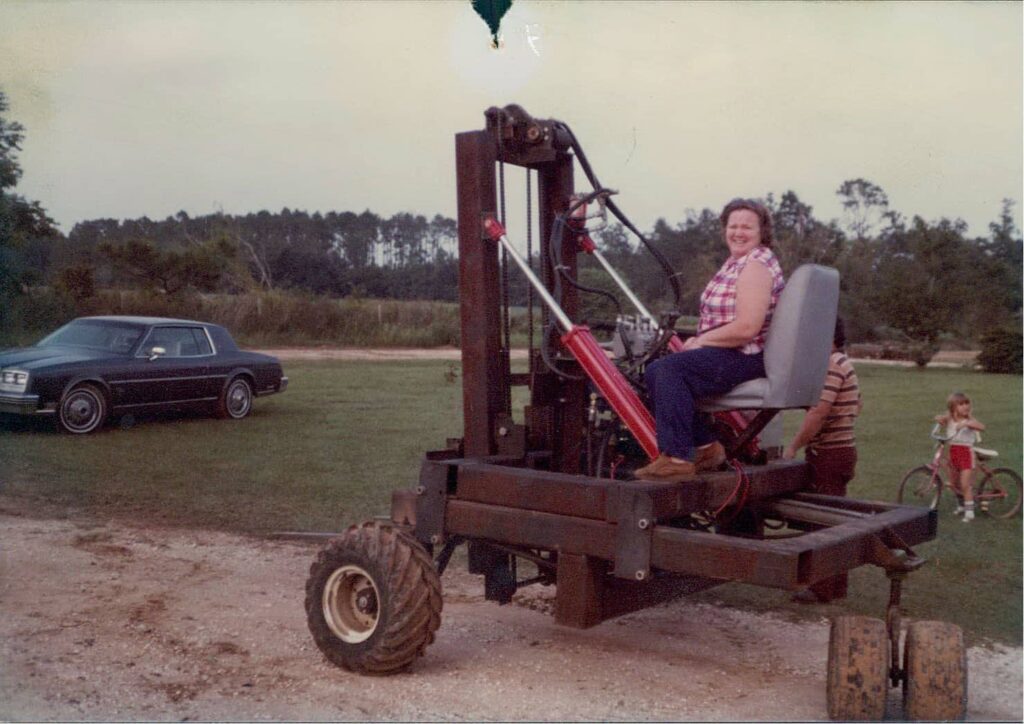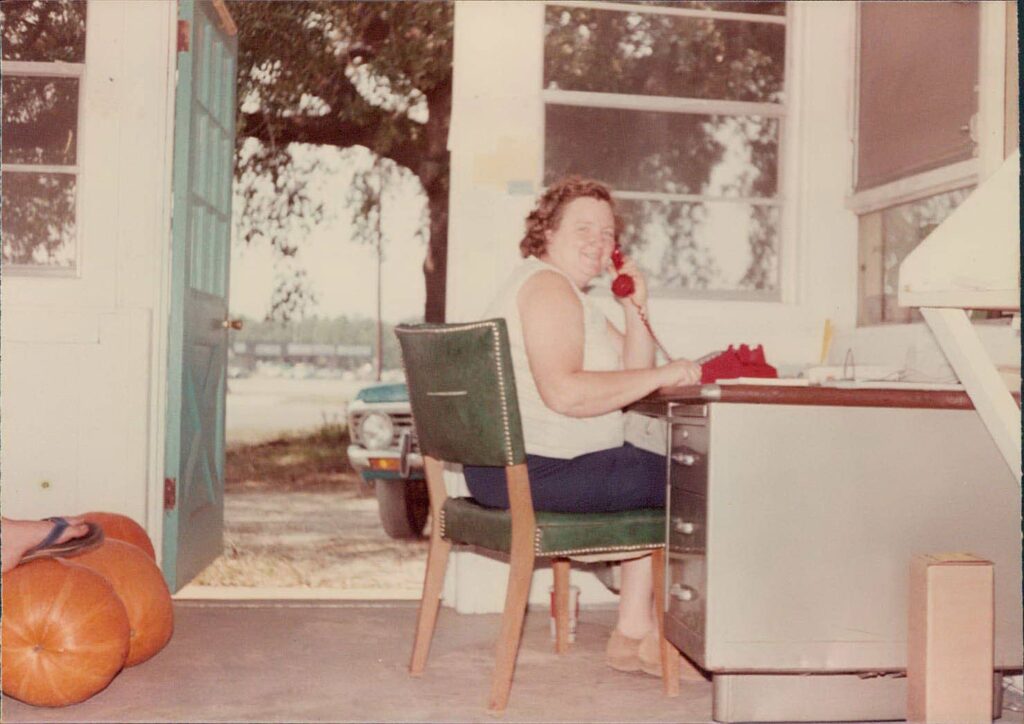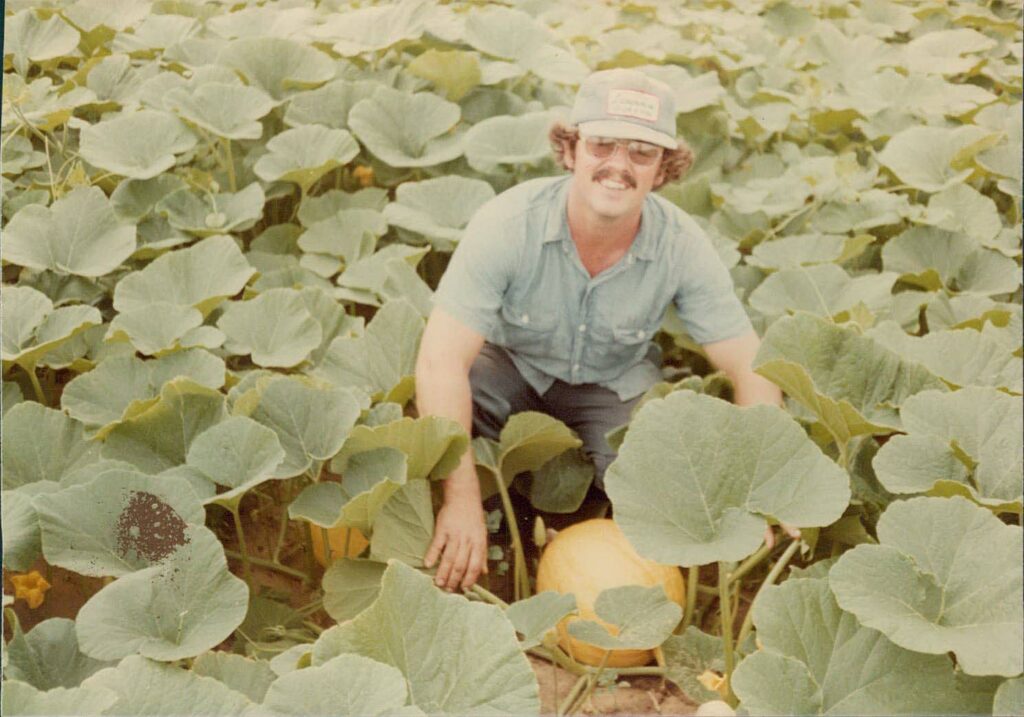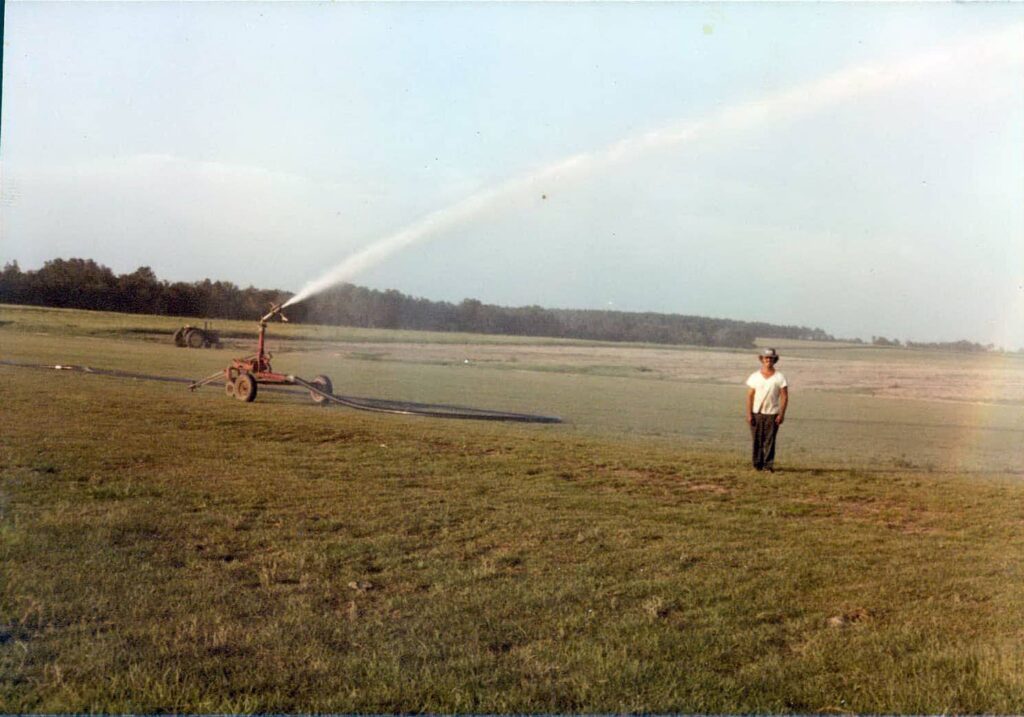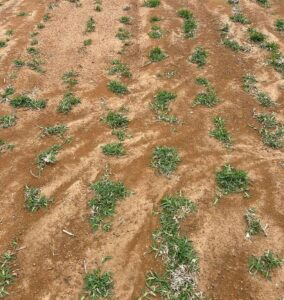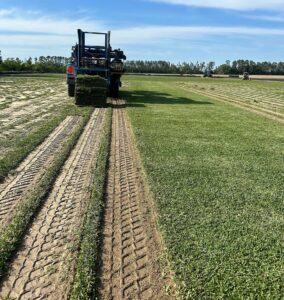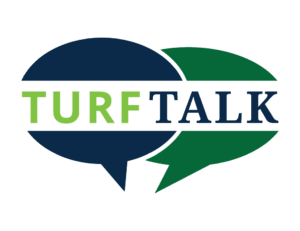
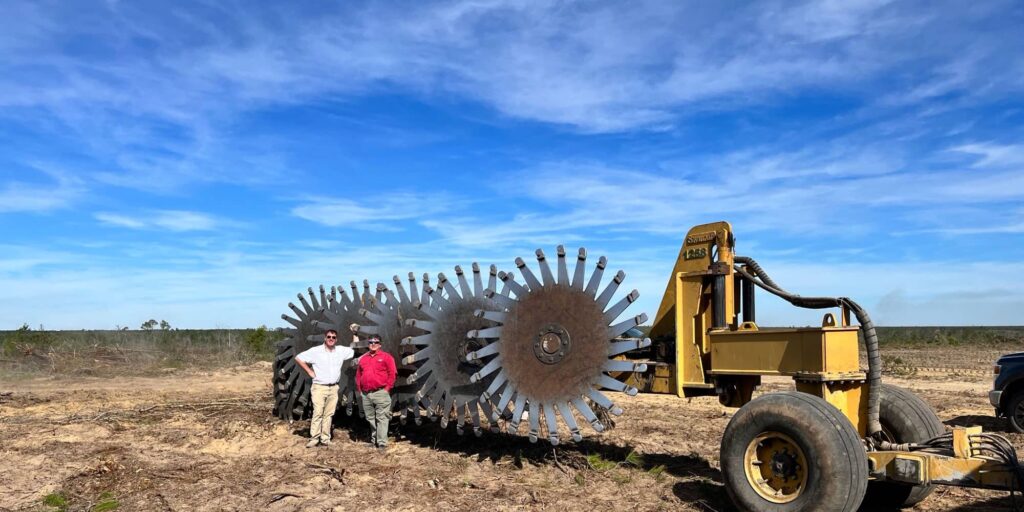
Woerner Farms’ Commitment to Turfgrass, Growth and Excellence
The name Woerner resonates within the southeastern United States turfgrass industry, rooted across generations. George Woerner’s grandfather who migrated from Germany to Alabama laid the groundwork for their agricultural lineage. Through various agricultural pursuits – produce, cattle and crop farming – the family ventured into turfgrass in 1978 by planting 20 acres of St. Augustine and centipede grass.
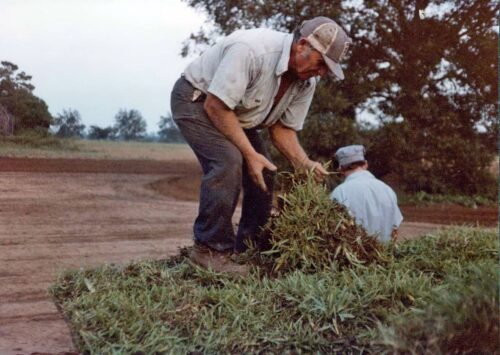
Grandpa Edward Woerner on a pallet of grass.
The Woerners grew produce until 1987, when they lost over 2,000 acres due to heavy rains. For the next five years, they focused primarily on turfgrass production to revitalize their business. George fondly recalls how his mother, Lillie, after raising eight children, established a successful sod outlet in Pensacola, FL, surpassing the combined earnings of all the Woerner boys. “She showed us the path to success in the turfgrass business,” George remarked, “which led us to expand to close to 20,000 acres of turfgrass around the country.”
Transitioning to the next generation, George’s son, Allen, grew up in the farming scene of an agricultural family in a small town called Elberta, in the heart of South Alabama. This original farm owned by the Woerners later expanded to all the seed and production operations they own throughout the United States.
Allen’s journey began with summers and breaks spent cultivating the farm, and he graduated in Geography from Auburn University in 2006. His initiation into the family business was serendipitous—responding to his father’s call to GPS fields in Donaldsonville, LA, which quickly escalated into hands-on involvement in farming operations. “This proceeded to start my career as a production manager living on the road helping the family grow our family business and turfgrass footprint,” he explained. During his early career, Allen navigated between hotel rooms across Louisiana and Florida while nurturing and expanding the Woerner owned brand.
Allen explained that the Great Recession forced them to think outside the box and make rapid changes to their business model. He recalled the necessity to auction, sell and reduce inventory, even reintegrating into produce farming to stabilize finances. In 2012, Allen became a 25% shareholder partner of jointly owned Woerner operations at that time, marking a significant milestone in the family’s business journey.
Allen remarked on the family’s evolution, “We worked hard and survived. As the family continued to grow and develop, we realized that different families had different dreams and aspirations.” This realization led to a strategic decision in 2017 to allow families to pursue separate growth opportunities, resulting in divided assets and George emerging as Woerner Farms, LLC along with Allen, with operations spanning multiple locations across the country.
Shifting to Proprietary Turfgrasses
The company’s focus shifted toward continued growth and enhancing grass varieties to adapt to evolving industry trends. “We started to diversify our model from commodity grasses at the time to more of these specialty branded grasses that offered better environmental attributes, ultimately for the producer and the end-user,” Allen said.
George explained it was pivotal for them to switch from commodity grasses to proprietary ones following the housing crash. He began to rely heavily on his son to scout new turfgrasses, ensuring their suitability before production.
“Through rapid expansion and growth, we continue to acquire more agricultural land and retail locations to expand our business model and have doubled our size since 2017. We actually have a much larger company in both revenue and profits and land holdings today than we had in 2017 when my father and I emerged and restarted.”
He said the entire team had the approach to go for it and never looked back. Their growth and pursuit to expand their footprint developed Woerner Farms, LLC into a totally different company servicing its customers with better grasses while still following its roots of being in the agricultural field.
New Varieties
Now, George said they focus on finding drought-tolerant and disease-resistant grasses. “Overall, we’ve made a lot of good decisions, and we’re in a lot of good marketplaces. In our area, there’s more competition and people in the turfgrass business in lower Alabama than any other place. We try to be totally differentiated and focus on building a brand rather than just moving a lot of product.”
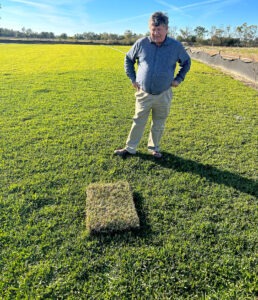
George Woerner looking at a slab of Classic in a Cobalt field.
“It appears our family brand grass, Classic St. Augustine, is taking second seat to these newer varieties coming on from the University of Florida, Sod Solutions and other turfgrass agencies and licensing companies,” Allen shared. George extracted Classic as a new variety during a freeze in the 1980s from a St. Augustine that had survived a really cold winter.
“Due to the genetic improvements and developments in these grasses now produced by these universities, they’re superior to these older varieties. And so now we find ourselves moving away from some of the foundation items that built Woerner up in the grass business and now we’re focused on sustainable grasses,” Allen said. He defined sustainable grasses to mean less inputs, less water consumption and overall, more grower and end-user friendly and quality turfgrass versus what was commercially available on the market.
Allen worked in grass production and farm development before becoming a managing partner. Now, he is on the administrative side, heavily focused on expanding agriculture holdings and operating the business to acquire real estate and natural resources. He explained that in the past, they could focus solely on planting and growing grass, whereas now, a lot of time is dedicated to the challenges of accessing water or applying for permits. They also drill irrigation wells and put up many new center pivots to develop a good farm model for the future.
As a part of the venture into new grasses, he hired Graham Simmons in 2018. Simmons worked for his own father’s sod farm when he got out of college. Now, after working as an assistant farm manager and regional production manager in Florida for Woerner Farms, he oversees all the southeast operations as the director of turfgrass operations.
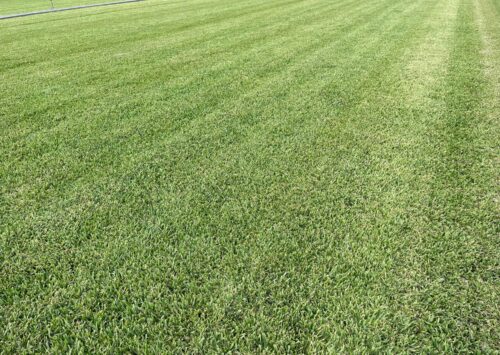
Cobalt Hybrid™ St. Augustine at Woerner Farms in Foley, AL in Sept. 2023.
Cobalt St. Augustine: A Beacon of Change
Simmons explained they follow National Turfgrass Evaluation Program (NTEP) trials and sites across Alabama, Florida, Texas and the Carolinas to determine which varieties to grow. After getting the grass from a breeder or licensing company, they’ll plant small plots to monitor how it handles various conditions such as drought, winter color, disease and insects at different farm locations. Most recently, Woerner attained a license for Cobalt™ St. Augustinegrass after following this process.
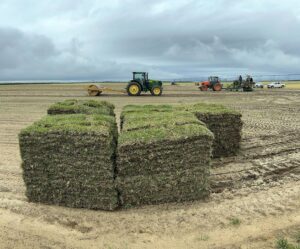
Cobalt Hybrid™ St. Augustine at Woerner Farms.
Simmons noted that Cobalt has held good winter color through temperatures in the low 20s, which are unusual for South Alabama. They’ve also observed fewer disease problems in Cobalt, particularly grey leaf spot. “Color and disease are the best (qualities), and we’re also seeing a little bit faster growth. We expanded from our foundation block and have 11 acres at our Clarksville farm and 11 acres at our Bon Secour farm. Our farm managers there both like it,” he said. He looks forward to observing how Cobalt’s color holds up this winter. Most recently, they expanded Cobalt to their farm in Bronson, FL, planting close to 20 acres.
Allen shared his insight on Cobalt, saying it could potentially replace older varieties like Floratam, aligning with their focus on sustainable grasses amidst water restrictions.
Involvement
Allen explained that all Woerner Farms, LLC farm managers are required to attend sod industry shows and events to see what’s coming into the marketplace with potential as well as for networking and education to do their job more efficiently. Some days, they’re at the University of Florida’s research facilities in Jay and Citra, FL, and other times, they’re traveling around the country to the Turfgrass Producers International (TPI) Conference and other industry events.
“I’ve met many smart, interesting people at different trade shows and industry events. It’s always a good opportunity to get in front of our vendors and continue to develop relationships with various vendors in the market and all the educational topics, learn more about different pesticides and fertility programs,” Simmons said. Most of all, he likes learning about new grass cultivars at tradeshows and said it’s a great place to get introduced to different grasses as a grower.
“I love being in sod production. I can’t imagine doing anything else. I’m really glad to work for Woerner. Allen and George are great to work for and they give us leeway as managers to make our own decisions and run things how we see fit from a fertility standpoint,” he added.
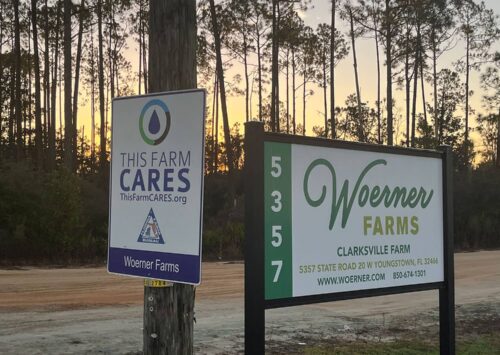
Woerner Farms
Industry Changes
Allen, who has seen the industry evolve, said farming was always favorably looked upon, but now they are under more scrutiny as grass producers than ever. “Outsiders are more concerned about water quality or other environmental issues, and it’s forced us to focus more on best management practices and be held more accountable for inputs and balances growing grasses as well as balancing natural resources.”
He explained that once they get a new farm operation running with a good team in place, they will move on to continue expanding. “Our expansions are led by good people and the ability to take on more and we just continue to take that model and stamp it out all over the US.” Allen described the turfgrass industry as a small scene that works like a big family.
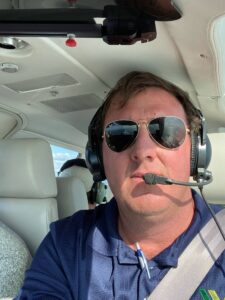
Allen Woerner flying a plane.
Woerner Farms’ significant production sites are in Bronson, FL, Clarksville, FL, Baldwin County, AL, in the Foley region and the business continues expanding outside of the Denver, CO area. Allen has a pilot’s license and enjoys flying to different business and farming locations. Turfgrass production only makes up about half of Woerner Farms, LLC. The store-based retail and wholesale model makes up about 50% of their sales. There are 160 employees total between Woerner Farms LLC and Woerner Landscape LLC.
Allen explains he enjoys focusing on the production side of things, watching crops get planted into the ground and grow until harvest. “My absolute passion in all of this is I really enjoyed planting grass. I love planting grass. Any opportunity I get to go actually run a planter myself, that’s kind of like a holiday for me.”
Allen is an active social media user, sharing videos from Woerner Farms, LLC. “As weird as it may sound, people enjoy farming videos and videos related to agriculture. When I started my Instagram account, thousands of people would watch and share videos. I was amazed at what I had taken for granted, as everyday life apparently was like living the American dream. They want to follow along with me as if they’re in the field.”
Future Goals
Allen’s future goals include strategically positioning Woerner Farms to serve the marketplace better. “The model moving forward appears to be smaller farms strategically located in close proximity to the market versus the historical viewpoint of major production sites with several thousand acres produced in one area and then shipped a long way down the road.”
“Management of natural resources is going to be key to the future of production of sod and proper management. That’s showing itself more and more as we have to balance a finite amount of water resources and better utilize those resources so that we balance what’s being consumed at city levels and yard irrigation levels and at the production side. We’ve got to be good stewards of natural resources.”
Allen said water is cheaper today than it will be tomorrow and they will have to continue to learn how to do more with less. “None of us growers should take for granted the access to water resources and securing them long term so we can continue to do what we do best farming moving forward.”
Allen attests he couldn’t be successful without the support of his wife of 19 years, Nicole, and their three children, Katherine, William and Pilot.
“Dad has done an incredible job of passing the torch on to the next generation, especially at the right times when they were willing and able,” Allen said.
George has three daughters who are also owners in the business. Angela Woerner actively participates daily in the business and oversees marketing, inventory and online sales. Christina Woerner McInnis is CEO and founder of SoilKit by AgriTech Corp. and consults with the family business about software, technology and marketing. Kimberly Woerner Bailey is a Senior Project Manager for Brasfield and Gorrie in the Carolinas.
George believes they’ve built a committed group of individuals within their company. “They’re like family members and we have built a really great team of people that are very like-minded and hard-working. People are trying to build a career in our company rather than just a job, so we focus hard on that,” he said. “At the end of the day, it’s dirt, iron and grass, but the difference is the people. We’ve built up a great team of people and that’s where our strength lies.”
For more information about Woerner Farms, click here.
This article was written by Cecilia Brown.
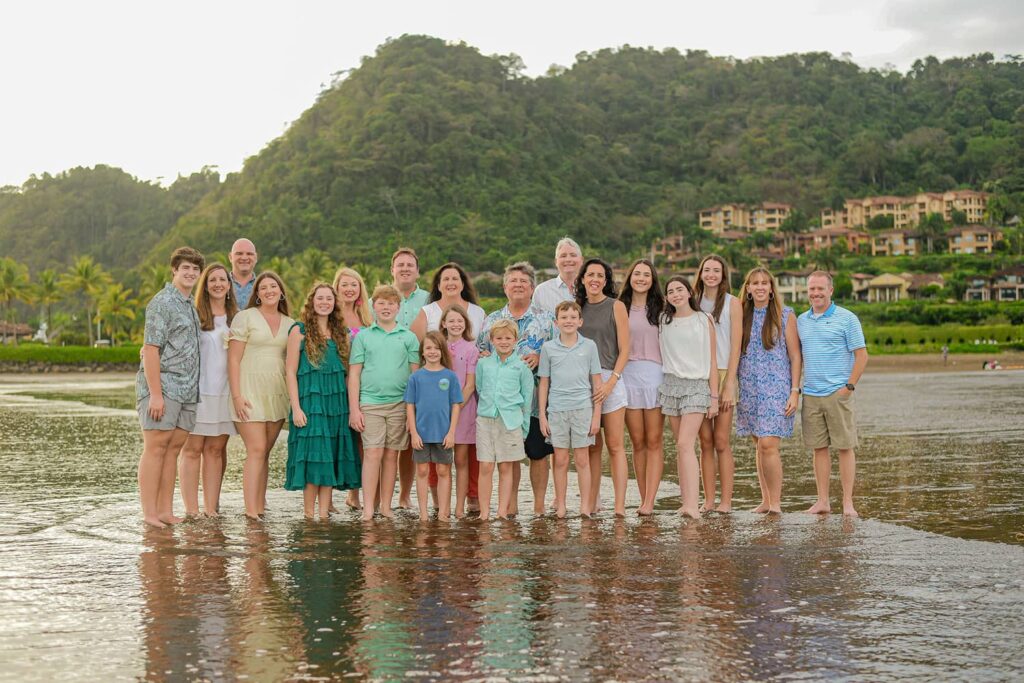
The Woerner Family

